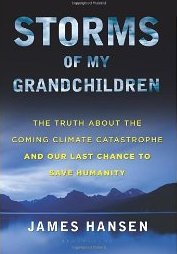Themes
In the book, Hansen describes how the burning of fossil fuels is changing our climate and argues that this is putting Earth into imminent peril. He suggests that millions of species, and humanity itself, are threatened. [2] The title of the book, Storms of My Grandchildren, refers to the ferocious and stormy weather events that will occur in the next generation if fossil fuel use continues in the way it has. [3]
In Hansen's evaluation, the response of politicians to this crisis has mainly been "greenwashing", where their proposals sound good but amount to little. [2] Hansen says that we immediately need to cut back atmospheric carbon dioxide emissions such that atmospheric concentrations are stabilized at 350 ppm or less, in order to avoid environmental disasters for generations to come. He advocates prompt phaseout of coal plant emissions, plus improved forestry and agricultural practices. [2] Hansen supports a carbon tax returned to citizens as a dividend and rejects cap and trade. [4] He also supports nuclear power and rejects geoengineering. [5]
This page is based on this
Wikipedia article Text is available under the
CC BY-SA 4.0 license; additional terms may apply.
Images, videos and audio are available under their respective licenses.
